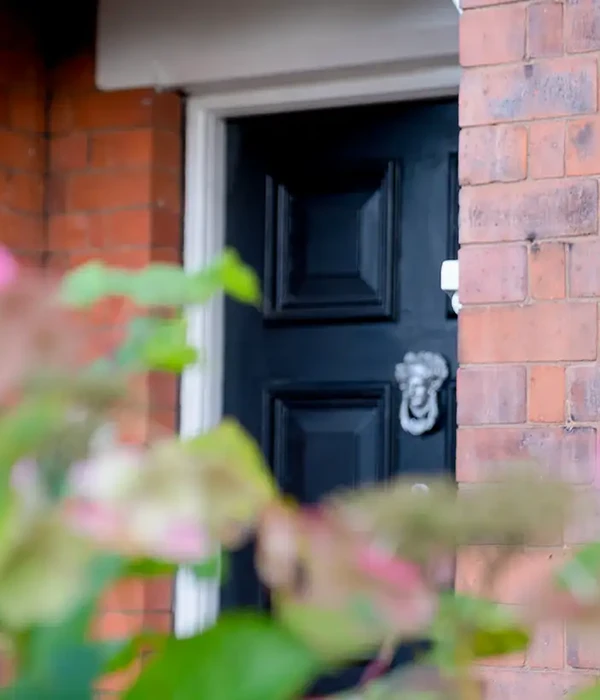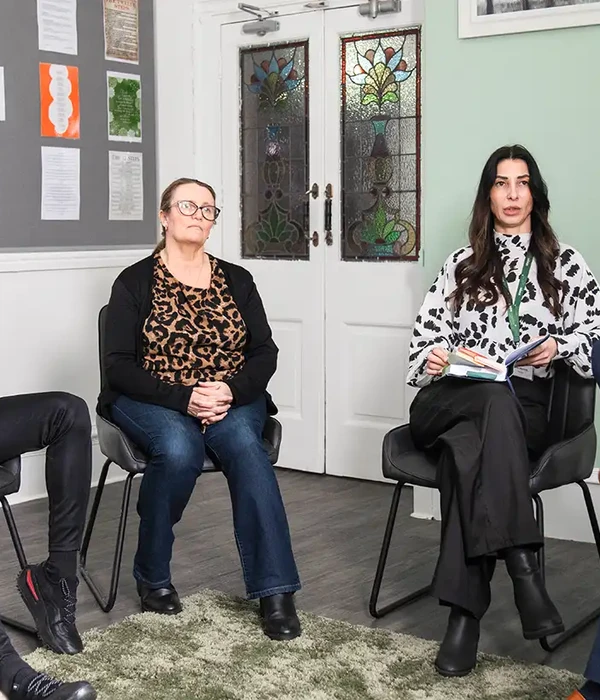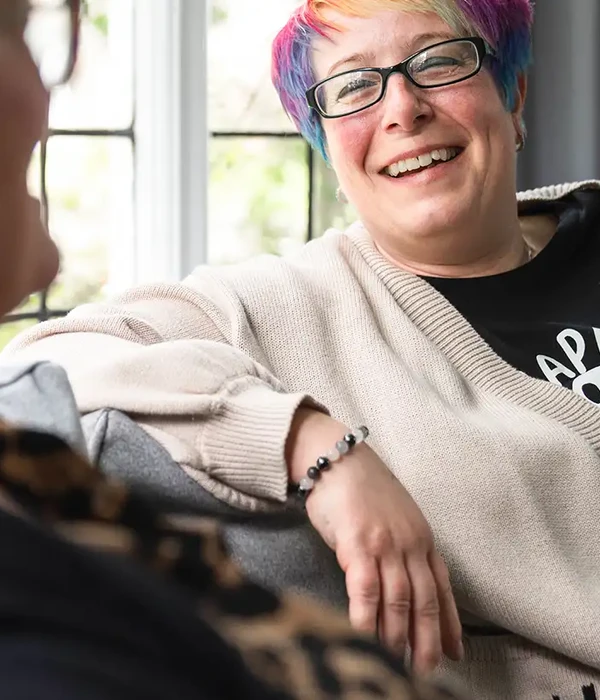Dialectical Behaviour Therapy
At Steps Together, we understand how overwhelming life can feel when emotions seem impossible to manage. That’s why we offer dialectical behaviour therapy (DBT) as part of our supportive care. DBT is a structured form of emotional regulation therapy that helps you build practical skills to manage intense feelings, strengthen relationships, and create lasting change.
We use DBT skills training to guide you through techniques such as mindfulness, distress tolerance, and interpersonal effectiveness. These skills don’t just focus on coping in the moment—they also help you develop healthier patterns for the future. By combining acceptance with strategies for change, DBT offers a balanced approach that can make everyday challenges feel more manageable.
Our programmes are designed to fit within a wider continuum of care, ensuring that support is available when it’s needed most. Whether you want to understand what dialectical therapy involves, explore its benefits, or learn about options and costs in the UK, we’re here to make the journey clearer and more accessible.

Supportive care when you need it most
We understand how important it is to feel supported when facing challenges with your mental health. That’s why we provide a safe space where you can learn practical skills, build confidence, and take steady steps towards lasting change.

Dialectical Behaviour Therapy (DBT) is a structured form of psychotherapy that combines behavioural strategies with acceptance-based approaches. It focuses on teaching practical skills to manage overwhelming emotions, build healthier relationships, and reduce harmful behaviours.
How DBT Works
We use DBT as a skills-based therapy that blends cognitive behavioural methods with mindfulness practices. The approach is “dialectical” because it balances acceptance of current experiences with the need for change. This balance helps people move away from rigid or extreme thinking patterns.
DBT is usually delivered through a combination of individual therapy, group skills training, and coaching support. Each part plays a role in reinforcing new ways of responding to stressful situations. Clients often practise daily exercises, such as mindfulness skills, to strengthen their ability to stay present and regulate emotions.
The therapy is organised into four core skills: mindfulness, emotion regulation, distress tolerance, and interpersonal effectiveness. These skills are taught step by step and applied to real-life challenges. Over time, clients learn to recognise unhelpful behaviours, pause before reacting, and choose healthier responses.


Who Is DBT For?
DBT was originally developed as a borderline personality disorder treatment, particularly for individuals experiencing intense emotions and self-destructive behaviours. It remains one of the most researched and effective therapies for BPD, but its use has expanded to other conditions.
We now see DBT supporting people with depression, post-traumatic stress disorder, eating disorders, and substance misuse. It can also help those who struggle with impulsivity, frequent conflict, or difficulty maintaining stable relationships.
DBT for adolescents has become increasingly common, as young people often face challenges with emotional regulation and identity. By learning skills early, they can build resilience and healthier coping strategies that support long-term wellbeing.
Benefits and Effectiveness of DBT
Dialectical Behaviour Therapy offers structured, evidence-based strategies that target both emotional and practical challenges. Research highlights its role in improving emotional regulation, strengthening relationships, and supporting recovery across a wide range of mental health conditions. It also matters how DBT is delivered, who provides it, and the level of commitment involved in treatment.
Emotional Regulation and Distress Tolerance
We know that intense emotions can overwhelm people and lead to unhelpful coping behaviours. DBT directly addresses this by teaching skills in emotional regulation and distress tolerance. These skills help individuals manage crises without resorting to harmful actions such as self-injury, substance misuse, or impulsive decision-making.
Emotional regulation modules focus on recognising triggers, naming emotions accurately, and reducing vulnerability to mood swings. Distress tolerance techniques, such as grounding and paced breathing, give practical tools for handling acute stress.
Outcomes research shows measurable improvements in people’s ability to cope with high-stress situations after DBT. This makes it particularly valuable for those living with borderline personality disorder, PTSD, or other conditions where emotional intensity is a daily struggle. By practising these skills consistently, individuals gain stability and confidence in managing their own responses.
DBT for Adolescents and Teenagers
Adolescents often struggle with identity, peer pressure, and heightened emotions. DBT has been adapted specifically for young people to address these developmental challenges. The adolescent model includes family involvement, which helps parents and carers learn the same skills and support progress at home.
We see improvements in areas such as self-harm reduction, emotional regulation, and resilience in coping with academic or social stress. Research also shows reductions in depression and anxiety among young participants after structured DBT programmes.
The group format often works well for teenagers, as it provides peer support and normalises their experiences. By engaging families alongside the young person, DBT builds a shared language for managing conflict, setting boundaries, and supporting healthier communication at home. This makes it a strong option for early intervention.
Time Commitment and Duration
DBT is not a short-term therapy. A standard programme usually runs for around six months to a year, with weekly individual sessions and group skills training. Some people continue for longer depending on their needs and progress.
The commitment is significant, as practice between sessions is essential. Homework exercises, such as diary cards and mindfulness practice, form a core part of the process. Without consistent effort outside therapy, progress is slower.
We explain to clients that DBT is an investment in long-term change. While the time frame may feel demanding, outcomes research shows that those who complete the full programme experience lasting improvements in both emotional stability and everyday functioning.
Interpersonal Effectiveness Skills
DBT places equal emphasis on relationships. Many people entering therapy report difficulties with boundaries, communication, and trust. Interpersonal effectiveness skills provide structured methods for asking for needs, saying no, and maintaining self-respect while still respecting others.
We teach clients to balance assertiveness with empathy. For example, role-play exercises help them practise real-world scenarios, such as negotiating with family or colleagues. These strategies reduce conflict and improve cooperation in both personal and professional settings.
Evidence from clinical trials shows that DBT participants report higher satisfaction in relationships and fewer breakdowns in communication. This is crucial because supportive relationships are often protective factors in recovery. By strengthening these skills, DBT not only addresses symptoms but also improves day-to-day quality of life.
NHS versus Private DBT
In the UK, DBT is available through the NHS but access can be limited. Waiting lists are often long, and availability may depend on the local mental health trust. NHS programmes usually prioritise individuals with complex needs, such as borderline personality disorder or high-risk behaviours.
Private DBT services offer faster access and more flexibility in scheduling. They may also provide a wider range of formats, including intensive outpatient programmes or one-to-one therapy outside standard NHS criteria.
However, private treatment comes with higher costs, which can be a barrier for some. The decision between NHS and private care often depends on urgency, personal circumstances, and the level of support required. Both routes follow evidence-based DBT principles, but the accessibility and intensity of treatment can differ significantly.
Therapist Qualifications and Accreditations
The effectiveness of DBT depends heavily on the therapist’s training. Qualified DBT practitioners undergo specialised training beyond standard psychotherapy qualifications. In the UK, this often includes accreditation with organisations such as the British Isles DBT Training team.
Therapists must also work within a consultation team, which is a required part of the DBT model. This ensures accountability, prevents burnout, and maintains fidelity to the treatment approach.
When choosing a provider, it is important to check that therapists are fully trained in DBT rather than offering only partial elements. A trauma-informed approach, combined with proper accreditation, ensures that clients receive safe, structured, and effective therapy that aligns with the evidence base.
Other Therapy Modalities at Our Treatment Centres
We focus on structured, compassionate care that combines evidence-based therapy with practical support. Our approach emphasises individual growth, community connection, and long-term stability through tailored sessions and flexible treatment options.

DBT Programme Structure and Options
We provide structured support that combines individual therapy, group skills training, and family involvement. Each programme is designed to help people practise DBT skills in settings that match their needs and stage of recovery.
Residential Addiction Treatment
In a residential setting, DBT is delivered within a highly structured environment where daily routines support consistent practice of skills. Clients take part in individual therapy sessions, skills groups, and structured activities that reinforce emotional regulation and interpersonal effectiveness.
This approach is particularly effective for people who need intensive support away from everyday triggers. By living on site, clients benefit from round-the-clock therapeutic input and a community that encourages accountability.
Family involvement is also integrated, with options such as monthly family therapy online to strengthen relationships and support long-term recovery


Outpatient Treatment Options
Outpatient DBT provides flexibility for those who want to continue daily responsibilities while receiving structured therapy. Sessions typically include weekly individual therapy, skills training groups, and regular check-ins to track progress and address challenges.
This format works well for people who have a stable home environment but still need structured therapeutic support. It allows us to adapt DBT principles to real-life situations, giving clients the chance to apply skills immediately in their daily routines.
Next Steps Towards DBT Support
Accessing dialectical behaviour therapy involves knowing where to look for qualified clinicians, understanding the financial aspects of treatment, and taking practical steps to begin therapy. Each stage requires clear information to help us make informed decisions with confidence.
In the UK, DBT is available through both the NHS and private practice. NHS access usually requires a referral from a GP or mental health professional, and waiting times can vary depending on local services. Some NHS trusts have specialist DBT teams, while others may only offer partial programmes.
Private options allow us to find therapists more quickly. Many practitioners list their services on directories such as the British Psychological Society or the Association for Behavioural and Cognitive Psychotherapies. When choosing a therapist, we should confirm their training in comprehensive DBT, not just skills groups, to ensure we receive the full model.
It is also worth asking whether the clinician offers individual therapy, group skills training, or both. A complete DBT programme usually combines these elements, so clarity at the outset helps us understand what kind of support we will receive.
Costs differ depending on whether we use NHS or private services. NHS treatment is free at the point of delivery, though access can be limited. Private DBT typically ranges from £80 to £150 per individual session, with group sessions often priced lower per participant.
Some private health insurers cover DBT, but coverage depends on the provider and policy. We should contact our insurer directly to confirm whether DBT is included and if pre-authorisation is needed. For those paying out of pocket, some clinics offer reduced rates for block bookings or concessionary fees for students.
It is important to ask about the full cost of a programme, not just individual sessions. DBT often runs over several months, so knowing the likely financial commitment helps us plan realistically.
Once we identify a suitable therapist or service, the next step is arranging an initial consultation. This first meeting usually involves an assessment of our needs, discussion of treatment goals, and an explanation of how DBT will be structured.
Some services ask for a GP referral before booking, especially within the NHS. Private providers often allow us to self-refer by contacting them directly through email, phone, or an online form.
During the consultation, it is helpful to ask about session frequency, expected duration of treatment, and availability of group skills classes. This ensures we understand the commitment involved and can decide if the service fits our circumstances before starting therapy.
Conditions DBT Can Help With
We use dialectical behaviour therapy to support people facing challenges with emotional regulation, relationships, and harmful coping strategies. This approach has been adapted to address a range of mental health conditions where managing distress and building resilience are essential.
Borderline Personality Disorder Care
DBT was originally developed to treat Borderline personality disorder treatment (BPD) , and it remains one of the most effective approaches for this condition. People living with BPD often experience intense mood swings, unstable relationships, and difficulties with self-image. These challenges can lead to impulsive behaviours, including self-harm or suicidal thoughts.
Through DBT, we focus on teaching practical skills in four areas: mindfulness, distress tolerance, emotional regulation, and interpersonal effectiveness. These skills help individuals reduce harmful behaviours, manage overwhelming emotions, and build healthier relationships.
Our programmes combine individual therapy with group skills sessions, giving people the chance to practise new strategies in a safe, supportive environment. Over time, this structured approach can reduce crises and foster greater stability in daily life.
Anxiety Treatment Services
Anxiety disorders often involve excessive worry, physical tension, and avoidance behaviours that interfere with daily life. DBT offers a clear framework for managing these symptoms by teaching skills that reduce reactivity and improve coping under stress.
We focus on mindfulness practices to help individuals stay present rather than becoming overwhelmed by anxious thoughts. Distress tolerance skills also play a key role, allowing people to manage uncomfortable emotions without turning to avoidance or unhealthy coping strategies.
Over time, DBT can help reduce the intensity of anxiety responses. By practising these techniques consistently, individuals learn to face challenging situations with greater confidence and less fear.
Dual Diagnosis Care
Dual diagnosis refers to the presence of both a mental health condition and substance use difficulties. This combination often creates complex challenges that require an integrated approach. DBT is well-suited to this because it addresses emotional regulation while also reducing harmful behaviours.
We focus on helping individuals understand the link between substance use and emotional distress. By teaching healthier coping strategies, DBT reduces reliance on drugs or alcohol as a way of managing pain.
Our programmes combine individual support with group sessions, ensuring that people receive consistent guidance while practising new skills. This approach helps build stability and reduces the risk of relapse, supporting progress in both mental health and recovery from substance use.
Depression Treatment Programmes
Depression often brings persistent low mood, loss of motivation, and difficulty in managing daily responsibilities. When traditional treatments alone are not enough, DBT for depression offers a structured way to address both emotional pain and unhelpful patterns of behaviour.
We use DBT to help people identify triggers, challenge negative thinking, and build routines that support recovery. The therapy emphasises acceptance alongside change, which can be particularly effective for those who struggle with feelings of hopelessness.
By strengthening skills in emotional regulation and problem-solving, DBT provides tools to reduce the impact of depressive episodes. This approach can also complement other treatments, such as medication or cognitive behavioural therapy, for a more comprehensive plan.
PTSD Treatment Options
Post-traumatic stress disorder (PTSD) can cause flashbacks, nightmares, and heightened emotional responses. DBT provides a structured approach to help individuals stabilise before addressing trauma directly, which makes it a useful option for those who feel unsafe or overwhelmed.
We use DBT to teach grounding skills that reduce the intensity of trauma-related symptoms. Emotional regulation and distress tolerance are particularly important for managing sudden triggers or intrusive memories.
Once stability is established, DBT can be integrated with trauma-focused therapies to build resilience and support long-term recovery. This step-by-step approach helps people feel more in control as they work through difficult experiences.

Begin your journey with Steps Together
We know that taking the first step towards support can feel daunting, especially when living with intense emotions or challenges linked to addiction recovery. That’s why we focus on creating a safe and structured space where you can begin to explore Dialectical Behaviour Therapy at your own pace.
Our team works alongside you to build practical skills that can strengthen your mental health and help you manage daily pressures more effectively. Whether you are based in the UK or further afield, we are here to guide you through those early stages of change.
At Steps Together, we believe that small, consistent steps can make a meaningful difference. By working with us, you gain support that encourages stability, self-awareness, and healthier connections with those around you.
Dialectical Behaviour Therapy FAQs
We often hear practical questions about how DBT works, who it helps, and what treatment involves in the UK. These answers focus on access, costs, therapist training, and how DBT differs from other therapies.
What is Dialectical Behaviour Therapy and how is it different from CBT?
DBT is a structured form of psychotherapy that combines cognitive-behavioural strategies with mindfulness and acceptance-based approaches. It was originally developed to treat borderline personality disorder but is now used for a range of difficulties linked to intense emotions.
Unlike standard CBT, which focuses mainly on identifying and changing unhelpful thoughts and behaviours, DBT places equal emphasis on acceptance and change. This means we help people recognise their feelings without judgement while also learning practical skills to manage them.
DBT also differs in format. It usually combines individual therapy with group skills training, whereas CBT is often delivered one-to-one. The group element in DBT gives people the chance to practise new skills with guidance and feedback.
How long does DBT treatment usually last?
DBT is not a short-term therapy. A standard programme often lasts around 12 months, combining weekly individual sessions with weekly group skills classes. This allows enough time to learn, practise, and reinforce the techniques.
Some people may complete treatment in less than a year, while others continue for 18–24 months. The duration depends on the severity of symptoms, whether trauma is also being addressed, and how well the therapeutic relationship develops.
We find that the structured nature of DBT means progress builds gradually. The length of treatment is designed to give people the best chance of applying the skills in real-life situations.
How much does private DBT therapy cost?
Private DBT can vary widely in cost depending on the provider, location, and whether sessions are individual, group-based, or both. In the UK, individual sessions often range from £80 to £150 per hour. Group skills classes may be charged separately, sometimes on a per-session or block basis.
A full DBT programme, including weekly individual and group sessions, can therefore cost several thousand pounds over the course of a year. Some clinics offer reduced rates, sliding scales, or payment plans to make treatment more accessible.
We advise checking what is included in the quoted fee, as some providers bundle materials, phone coaching, or additional support into the cost.
Are there online or remote DBT programmes?
Yes, many therapists and clinics now offer DBT online, either through video calls for individual therapy or virtual groups for skills training. This has become more common since the pandemic and can make treatment accessible to people who cannot attend in person.
Remote DBT follows the same structure as face-to-face programmes, with weekly sessions and skills practice. Some services provide digital workbooks, recorded materials, or messaging support to supplement live sessions.
We find online DBT can be particularly useful for people in rural areas or those with mobility difficulties. However, it requires reliable internet access and a private space to maintain confidentiality.
Who can benefit from DBT in the UK?
DBT is most often recommended for people diagnosed with borderline personality disorder, especially where self-harm or suicidal thoughts are present. However, it can also support those with depression, eating disorders, substance misuse, or other problems linked to emotional regulation.
In the UK, DBT is sometimes offered to adolescents who struggle with impulsive behaviours or intense mood swings. It can also be helpful for adults who find relationships particularly difficult or who feel emotions more strongly than others.
We see DBT as an option for people who haven’t responded well to other therapies. Because it is skills-based, it can be especially useful for those who want practical tools for coping day to day.
Is DBT available on the NHS?
DBT is available on the NHS, but access can be limited. Specialist services are usually provided in secondary mental health care, often through community mental health teams or personality disorder services.
Referral usually requires an assessment by a psychiatrist or psychologist, and waiting times can be long depending on the area. Some regions may not offer a full DBT programme, instead providing adapted versions or skills groups.
We encourage people to speak to their GP if they are interested in NHS DBT. The GP can advise on what is available locally and make the necessary referral.
Does insurance cover DBT treatment?
Some private health insurance providers in the UK cover DBT, but policies differ. Coverage often depends on the diagnosis, the type of treatment recommended, and whether the therapist is recognised by the insurer.
Insurance may cover a set number of individual sessions but not group classes, or it may require pre-authorisation before treatment begins. Exclusions for personality disorders are also common in some policies.
We recommend contacting the insurance company directly to confirm whether DBT is included. It is important to clarify limits, excess payments, and whether both individual and group components are covered.
What qualifications should a DBT therapist have?
DBT therapists are usually qualified mental health professionals such as clinical psychologists, counsellors, or psychiatrists who have completed additional specialist training in DBT. Training is often provided by organisations accredited in delivering evidence-based DBT programmes.
In the UK, therapists may be members of professional bodies such as the British Psychological Society or the British Association for Behavioural and Cognitive Psychotherapies. These memberships provide assurance of professional standards and ethical practice.
We suggest checking that a therapist has formal DBT training and experience delivering full programmes, not just isolated skills. This ensures the treatment offered is consistent with the recognised model of DBT.





